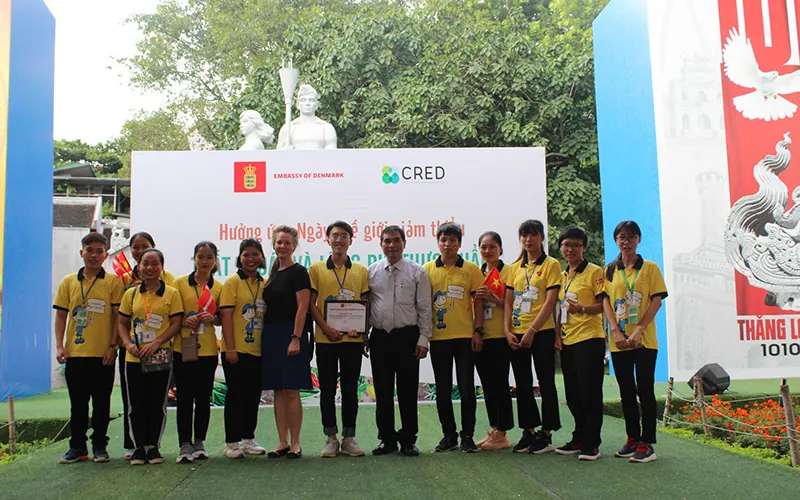Denmark supports Vietnam in campaign against food loss and waste
Total food losses in Vietnam are estimated at 8.8 million tons or US$3.9 billion in 2018, equivalent to 2% of Vietnam’s GDP or 12% of the country's agriculture value.
The Danish Embassy in Hanoi and the Vietnamese Ministry of Agriculture and Rural Development (MARD) on Saturday jointly launched the campaign ‘Actions against Food Loss and Waste’ with a photo exhibition opening for the public at the pedestrian zone around Hoan Kiem lake in Hanoi.
| Representatives of the Danish Embassy in Hanoi and MARD pose for photos with Vietnamese young people at the event on September 26. Photo: Danish Embassy |
The campaign, which is an initiative of the Danish Embassy in collaboration with MARD and co-organized by the local Center for Rural Economy Development (CRED), includes an exhibition, seminars and business meetings between Vietnamese and Danish sector experts and entrepreneurs in Hanoi and Ho Chi Minh City.
The exhibition, which is open for the public on September 26-27, aims at raising public awareness on food loss and waste and encouraging people to change their behaviors and habits towards responsible food consumption.
Attendants at the exhibition have the opportunity to get to know various creative ideas and initiatives on food loss and waste reduction at household level as well as to witness how food materials could be saved during processing as demonstrated by hotels, restaurants and university kitchens at the site.
“Food loss and waste is a serious global concern and the timing now is critical more than ever with the Covid-19 pandemic. Research findings show that one-third of food produced for human consumption is lost or wasted globally. This is a huge and awful loss given the fact that the number of people facing acute food insecurity could double this year to 265 million due to Covid-19 according to the UN World Food Program,” said Mr. Kim Højlund Christensen, ambassador of Denmark to Vietnam.
According to a survey in major agricultural regions of Vietnam carried out by CEL Consulting, a leading firm in providing advisory, engineering, technology and training solutions in the field of supply chain & operations, during the first quarter of 2018, on the average, a quarter of the food produced is lost before it actually reaches processing plants or distribution centers. Total losses are estimated at 8.8 million tons or US$3.9 billion (2% of Vietnam’s GDP or 12% of Vietnam’s agriculture value).
In Vietnam, the fruit and vegetable group accounts for the worst food loss in percentage, i.e. 32% of production, which is equal to approximately 7.3 million tons lost per year. For the meat industry, losses reach 14% or about 694,000 tons per year. In the fish and seafood group, losses represent 12% of production or about 804,000 tons per year.
“For Denmark, prevention of food loss and waste has been a national priority since 2010. Danish experts are happy to share innovative ideas and technologies gained during the past 10 years to inspire not only the food producers and processors in Vietnam but also the local consumers.
I hope that this campaign will help to raise awareness and highlight the fundamental importance of responsible food production and consumption in achieving a sustainable and prosperous world for all,” add Mr. Kim Højlund Christensen.
Besides, one seminar will be held in Hanoi on September 29 and another in Ho Chi Minh City on October 2. The seminars will provide a forum to connect and facilitate exchange of experience, knowledge and technologies between local decision-makers, sector managers as well as Danish and Vietnamese professionals and entrepreneurs from food industries and processing, such as rice, aquaculture products, meat, milk and fruit, etc.












